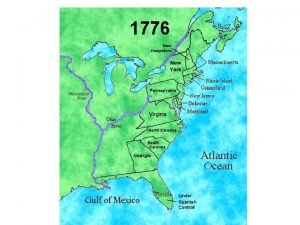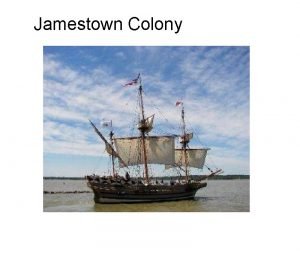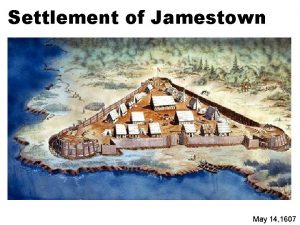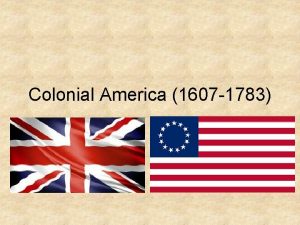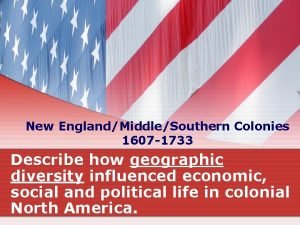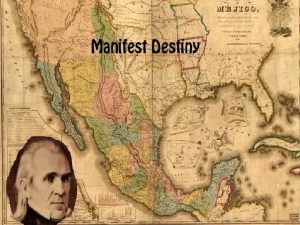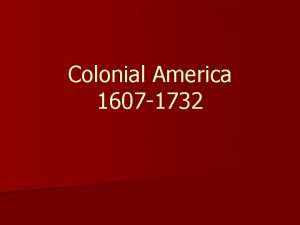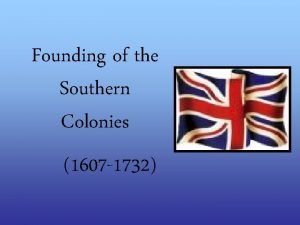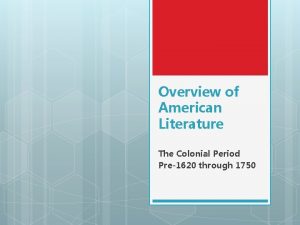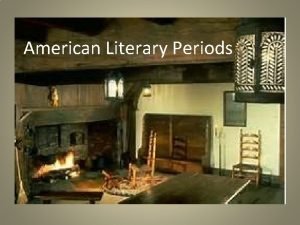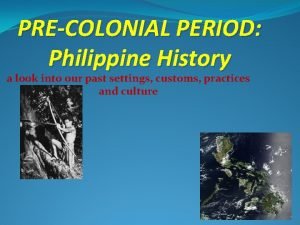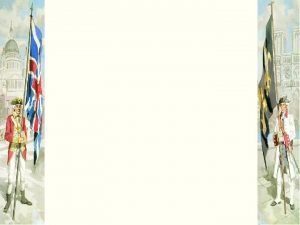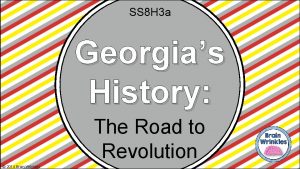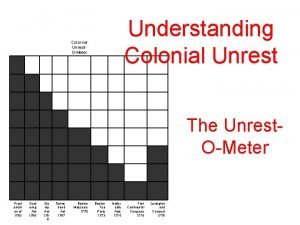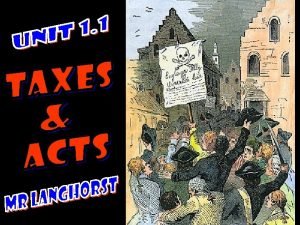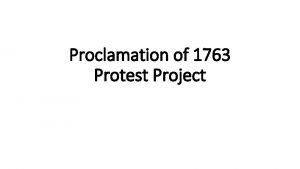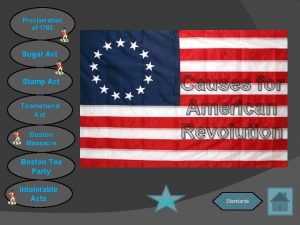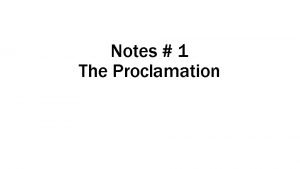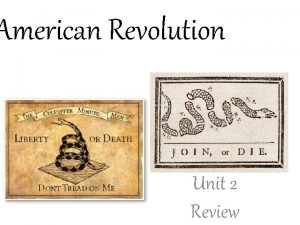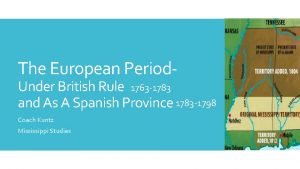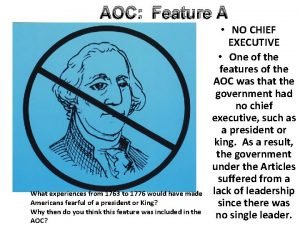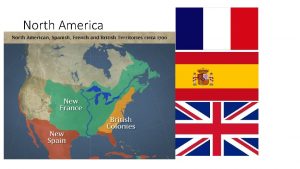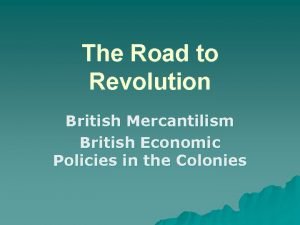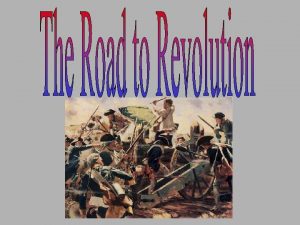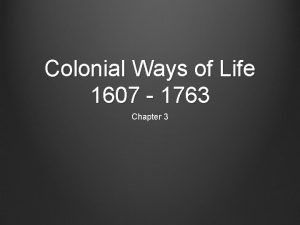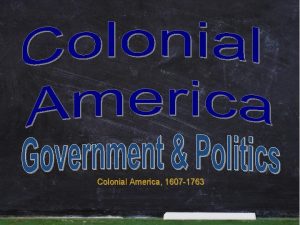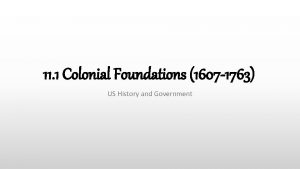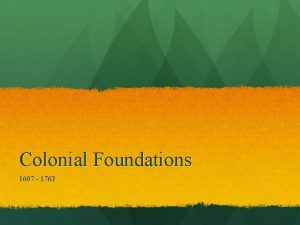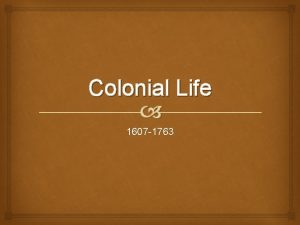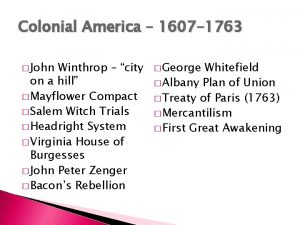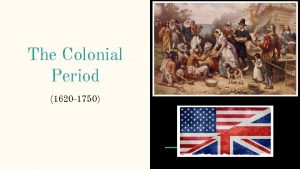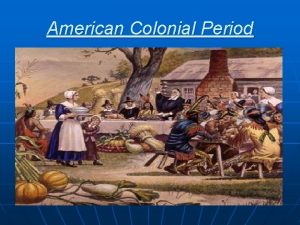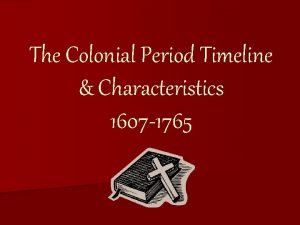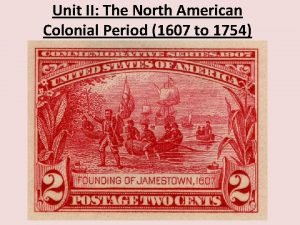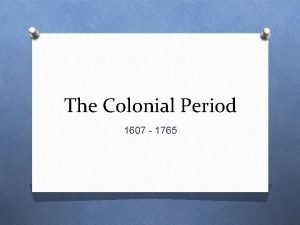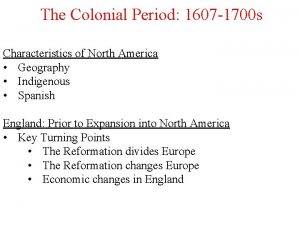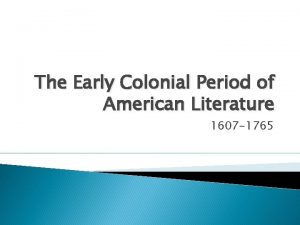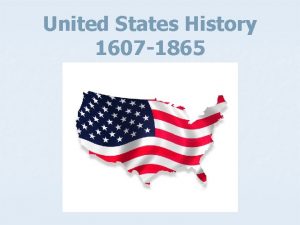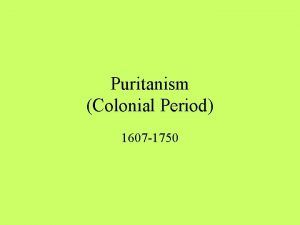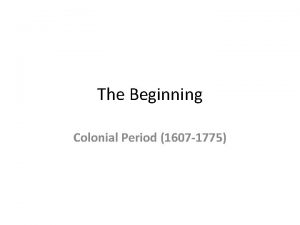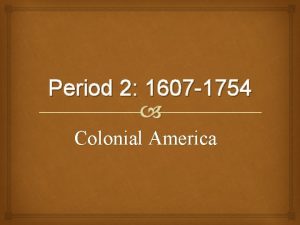The Colonial Period 1607 1763 Katy Pawlick Alex






























- Slides: 30

The Colonial Period (1607 -1763) Katy Pawlick Alex Higgins 1 st hour

Roanoke Established by Sir Walter Raleigh in 1578 When John White returned, he found the colony deserted

The Chesapeake Region

Virginia Jamestown Established in 1607 by the London Company (Virginia Company) Early settlers faced outbreaks of malaria “Starving Time” People began eating whatever they could find. Lord De La Warr eventually reached the dying colony with supplies and became the 1 st governor.

Expansion of Land Tobacco, indigo, cotton, rice John Rolfe experimented with tobacco which became popular in England Headright system Gave certain amounts of land to settlers based on the size of their families

House of Burgesses July 30, 1619 Delegates from various communities met in the Jamestown church. Established first representative legislative body

Bacon’s Rebellion Backcountry settlements were open to Native Attacks Nathaniel Bacon led an attack against the Natives in response to their raids Struggle between the “haves” and the “have nots” This was seen as an attack on colonial government Bacon burned down the city and sent the governor into exile Bacon would have taken over himself if he had not died from dysentery Eventually led to an Increased dependence on African slavery

Maryland Cecilius, the second Lord Baltimore received a charter. Leonard Calvert was governor Neighboring Indians were more worried about rival tribes Faced no Indian assaults, plagues, or starving time Encouraged the immigration of Protestants and English Catholics Conflicts between protestants and catholic minority Toleration Act

Indentured Servitude Workers bound themseles to masters for a fixed term and in return received pssage to America food and shelter Male indentures received clothing, tools, and land Many left service with nothing at all

Slavery Demand for slavery grew rapidly once tobacco became an important part of the economy Africans faced harsh conditions while traveling to America “Slave codes” limited the rights of blacks and ensured absolute authority of white masters Stono Rebellion- South Carolina 100 Africans rose up, seized weapons, killed several whites, and attempted to escape to Florida

New England Colonies

Pilgrims and Puritains Pilgrims Colonized America to escape religious persecution Puritans William Bradford- first governor Plymouth Mayflower Compact- Claimed allegiance to the King of England.

Puritan Society Religion was the main focus of daily life Poor community Theocracy Harvard Were Peaceful with Natives First Thanksgiving Rocky soil and short growing seasons Grew corn and developed fur trade with the Abenaki Indians

Massachusetts Bay Company Governor- John Winthrop Did not wish to break away form Church of England “City on a hill” Quickly Expanded

Conflicts with Native Americans Pequot Wars Conflict arose due to competition of trade with the Dutch in New Netherland King Philip’s War Wampanoags Metacomet

The Salem Witch Trials Hundreds of people were accused of witchcraft Nineteen residents of Salem were put to death Hysteria spread through many New England towns Reflected highly religious character of these societies

Middle Colonies

Quakers Pennsylvania The Society of Friends “Inner Light” Women held a position within the church equal to that of men No church government Pacifists William Penn- evangelist for Quakerism

New York and New Jersey James, the Duke of York New York was very diverse- Dutch, English, Scandinavian, German, French, Africans, Indian tribes Religious toleration Tensions over the distribution of power Sir George Carteret and Sir John Berkley New Jersey- Ethnic and religious diversity No important class of large landowners Small farmers

Southern Colonies

Carolinas Anthony Ashley Cooper Fundamental Constitution for Carolina was formed Created an elaborate system of land distribution and social order Northern and southern regions were widely separated South Carolina had close ties to the English Colony on the island of Barbados

Spanish Settlements Mexico, Florida, Texas, New Mexico, Arizona, and California Attracted religious minorities Devastating effect on Native population Died from diseases brought by colonists Spanish converted remaining natives to Catholicism, and recruited them as agricultural workers

Hostilities in Southeast English pirates harassed Spanish settlements and attacked St. Augustine Fighting in this region drove nearly all settlers out of Florida English prevailed and acquired Florida

Georgia James Oglethorpe Military barrier against Spanish lands on southern border No slavery or Catholics After failure to create a prosperous colony, the ban of slavery was removed

Chesapeake New England Middle Colonies Southern Colonies Motivation for Colonization Gold Escape prosecution in England “City on a Hill” Land riches Agriculture and Religion Role of religion Christianity Maryland-Act of toleration 1649 Theocracy Harvard Quakers. Pennsylvania Religious freedom for Christians Key figures De La Warr Bacon Berkley John Smith John Rolfe William Bradford John Winthrop William Penn James, the duke of York James Oglethorpe Economy “Starving Time” Trade Tobacco Grew corn and had fur trade with the Abenaki Indians Grain industry Strong bonds with barbados Geographic influences Swampy, hot, humid - great for growing of crops Rocky Soil Short growing seasons Small farms Rich soil Fertile soil- many crops Relations with Native Americans Virginia- hostile, thought they were superior Maryland-befrended natives Pequot War King Philip’s War Some trouble with Iroquois Converted them to Catholicism and used them for labor

Mercantilism Increased the total wealth of the nation Colonies provided a source of raw materials that England could not prodce England would have to exclude foreigners from colonial trade Increase exports, decrease imports

Navigation Acts Colonists traded with Spanish, French, and Dutch with goods that England did not import Parliament passed the Navigation Acts to regulate colonial commerce 1. (1660) Closed he colonies to all trade that wasn’t from English ships 2. (1663) All goods being shipped from Europe to the colonies had to pass through England on the way 3. (1673) Imposed duties on the coastal trade among the English colonies

Great Awakening John and Charles Wesley, John Whitefield, Jonathan Edwards Traditional Puritan ideas: Absolute sovereignty of God, Predestination, origina sin Edwards’ vivid descriptions of Hell sent fear into listeners.

Enlightenment Began in Europe Human reason and scientific inquiry Less emphasis on religion John Locke, Francis Bacon, Benjamin Franklin, Thomas Jefferson, Thomas Paine, James Madison

Colonial Government Americans created a group of institutions that gave them a great amount of self-government Focus of politics in the colonies became a local one British maintained a policy of salutary neglect, but ended it in 1763 This, along with taxation without representation will eventually lead the colonies into the American Revolution
 1776-1607
1776-1607 Www.goo
Www.goo May 14 1607
May 14 1607 1491 to 1607 timeline
1491 to 1607 timeline Blood on the river jamestown 1607
Blood on the river jamestown 1607 1783-1607
1783-1607 1733-1607
1733-1607 Expansion of the united states of america 1607 to 1853 map
Expansion of the united states of america 1607 to 1853 map 1732-1607
1732-1607 1607-1732
1607-1732 T
T American literature colonial period
American literature colonial period Flowers used in the english georgian period
Flowers used in the english georgian period Colonial literary period
Colonial literary period Pre-colonial period
Pre-colonial period Ancient egypt floral design
Ancient egypt floral design Map of north america 1763
Map of north america 1763 Proclamation of 1763 caricatures
Proclamation of 1763 caricatures What did the proclamation of 1763 forbid
What did the proclamation of 1763 forbid Proclamation of 1763
Proclamation of 1763 Why did the colonists hate the townshend acts
Why did the colonists hate the townshend acts Proclamation of 1763 protest poster
Proclamation of 1763 protest poster Proclamation of 1763
Proclamation of 1763 Proclamation of 1763
Proclamation of 1763 Proclamation of 1763
Proclamation of 1763 Under british rule, 1763-1783
Under british rule, 1763-1783 What experiences from 1763 to 1776
What experiences from 1763 to 1776 First nations attack fort michilimackinac 1763
First nations attack fort michilimackinac 1763 Ohio river valley 1763
Ohio river valley 1763 Navigation acts 1763
Navigation acts 1763 Proclamation of 1763
Proclamation of 1763
